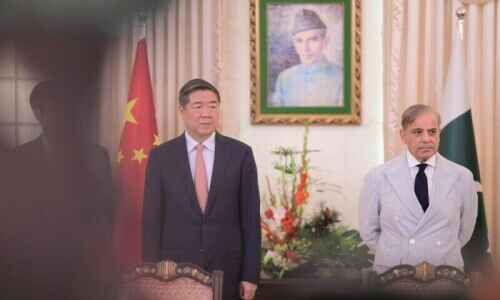ISLAMABAD: Prime Minister Shehbaz Sharif’s five-day visit to China next week is expected to focus heavily on the economy, although the results of the visit are not anticipated to have a significant effect on budgetary planning.
Speaking on behalf of the Chinese foreign ministry, Mao Ning announced on Friday that Mr. Sharif will hold talks with Premier Li Qiang and President Xi Jinping during his next trip, which begins tomorrow.
In addition, PM Shehbaz will travel to the northwest province of Shaanxi and the economic center of China, Guangdong.
“China and Pakistan have had close high-level exchanges in recent years, steadily advanced practical cooperation… on the China-Pakistan Economic Corridor (CPEC), and maintained sound communication and coordination in international and regional affairs under the guidance of the leaders of the two countries,” Ms. Mao stated.
However, the primary objective of the PM’s first visit to China as he begins his second term will be to discuss investments in the energy and agricultural sectors as well as Special Economic Zones from the perspective of both companies and governments.
Federal Minister for Planning and Development Ahsan Iqbal told Dawn on Sunday that the upcoming budget has already been written, therefore the PM’s visit won’t have a big effect on it.
The annual federal budget was supposed to be presented in parliament on June 10 or later when PM Shehbaz signs it off after his return, but it was postponed because of the PM’s scheduled travel. Normally, the annual federal budget is presented in parliament during the first week of June.
Beijing is anticipated to formally launch the second phase of the China Pakistan Economic Corridor (CPEC) during the PM’s visit. This phase will focus on deeper collaboration in infrastructure, agriculture, energy, and projects related to the cross-country rail line, Main Line-1.
According to the minister, agreements on energy-related projects would be reached in a manner similar to those with Independent Power Producers, meaning that the budget will not be impacted.
In the same way, agreements in the agriculture sector will focus on investments.
The ML-1 project would be highlighted during the PM’s visit, according to Mr. Iqbal, who is also in charge of CPEC projects in Pakistan. The government has already set aside some money for it in the upcoming budget.
He added that money had also been set aside for the Karakoram Highway realignment, since the prime minister’s visit is anticipated to bring up the issue.
According to a March remark from Zhao Shiren, China’s counsel general in Lahore, the South China Morning Post, Chinese debt makes about 13% of Pakistan’s total foreign debt.
Professor Zhu Yongbiao of Lanzhou University’s School of Politics and International Relations told SCMP that “economic and trade cooperation is still the main area [of the visit] in order to help Pakistan’s development and enhance its capacity of self-reliance.”
The official news outlet Xinhua reported, using figures from the Chinese embassy in Islamabad, that as of the end of 2022, the China-Pakistan Economic Corridor (CPEC) has brought in a total direct investment of US$25.4 billion to Pakistan.
Afghanistan may also come up throughout the conversation. China has begun to rely on the Taliban government in Afghanistan to stop cross-border assaults on Chinese soldiers, following Islamabad’s allegation that a March attack on Chinese citizens was planned from across its western border.








